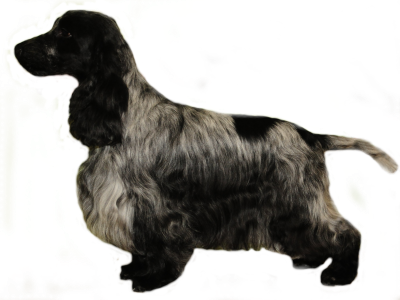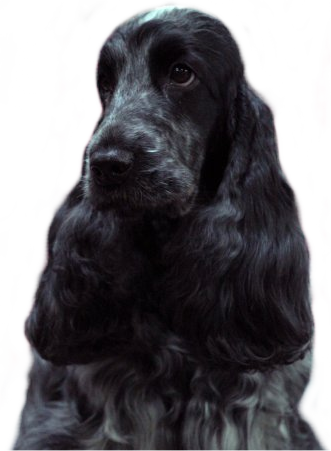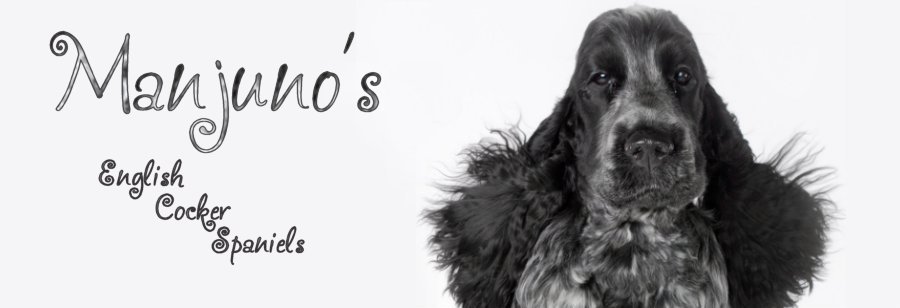FCI-Standard Nr. 5 / 23. 11. 2012 / EN
Classification FCI:
Group 8 (Retrievers, Flushing Dogs, Water Dogs)
Section 2 (Flushing Dogs with working trial)
|

|
Brief historical summary:
Cocker Spaniels were recognized as a separate breed from Field and Springer Spaniels soon
after the formation of the Kennel Club in 1873. He originated as the "cocking spaniel",
and derived this name from flushing woodcock.
|
General appearance:
Merry, sturdy, sporting; well balanced; compact.
|
Important proportions:
Measuring approximately the same from withers to ground as from withers to root of tail.
|
Behaviour / Temperament:
Merry nature with ever-wagging tail shows a typical bustling movement,
particularly when following scent, fearless of heavy cover.
Gentle and affectionate, yet full of life and exuberance.
|
Head:
Cranial region:
Skull: Well developed, cleanly chiselled, neither too fine nor too coarse.
Stop: Distinct, set midway between tip of nose and occiput.
Facial region:
Nose: Sufficiently wide for acute scenting power.
Muzzle: Square.
Jaws / Teeth: Jaws strong with a perfect, regular and complete scissor bite,
i.e. upper teeth closely overlapping lower teeth and set square to the jaws.
Cheek: Not prominent.
Eyes: Full, but not prominent. Dark brown or brown, never light,
but in the case of liver, liver roan and liver and white, dark hazel to harmonize with coat;
with expression of intelligence and gentleness but wide awake, bright and merry; rims tight.
Ears: Lobular, set low on level with eyes. Fine leathers extending to nose tip. Well clothed with long, straight silky hair.
|

|
Neck:
Moderate in length, muscular. Set neatly into fine sloping shoulders. Clean throat.
|
Body:
Strong, compact.
Topline: Firm, level, gently sloping downwards to tail from end of loin to set on of tail.
Loin: Short, wide.
Chest: Well developed and brisket deep; neither too wide nor too narrow in front. Ribs well sprung.
|
Tail:
Set on slightly lower than line of back. Must be merry in action and carried level, never cocked up.
Previously customarily docked.
Slightly curved, of moderate length, proportionate to size of body giving an overall balanced appearance;
ideally not reaching below the hock. Strong at the root and tapering to a fine tip;
well feathered in keeping with the coat. Lively in action, carried on a plane not higher than level of back and never so low as to indicate timidity.
|
Limbs:
Forequarters:
General appearance: Legs well boned, straight, sufficiently short for concentrated power.
Not too short to interfere with tremendous exertions expected from this grand, sporting dog.
Shoulders:Sloping and fine.
Fore feet: Firm, thickly padded, cat-like.
Hindquarters:
General appareances: Wide, well rounded, very muscular; legs well boned.
Stifle: Good bend.
Hock joint: Short below the hock joint, allowing for plenty of drive.
Hind feet: Firm, thickly padded, cat-like.
|
Gait / Movement:
True through action with great drive covering ground well.
|
Coat:
Hair:
Flat, silky in texture, never wiry or wavy, not too profuse and never curly. Well feathered forelegs, body and hind legs above hocks.
Colour:
Solid colours: Black; red; golden; liver (chocolate); black-and-tan; liver-and-tan; No white allowed except a small amount on chest.
Particolours:
Bicolours: Black and white; orange and white; liver and white; lemon and white. All with or without ticking.
Tricolours: Black, white and tan; liver, white and tan.
Roans: Blue roan; orange roan; lemon roan; liver roan; blue roan and tan; liver roan and tan.
Any colour or marking other than the above is undesirable.
|
Size and weight:
Height approximately: Males 39 - 41 cms, Females 38 - 39 cms
Weight approximately 13 - 14, 5 kgs
|
Faults:
Any departure from the foregoing points should be considered a fault and the seriousness
with which the fault should be regarded should be in exact proportion to its degree and its effect
upon the health and welfare of the dog and on its ability to perform its traditional work.
Male animals should have two apparently normal testicles fully descended into the scrotum.
|
Disqualifying faults:
x) Aggressive or overly shy.
x) Any dog clearly showing physical or behavioural abnormalities shall be disqualified.
|











